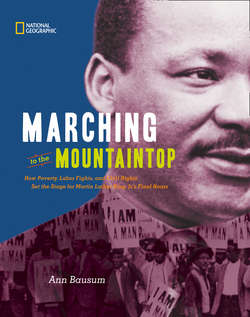Читать книгу Marching to the Mountaintop: How Poverty, Labor Fights and Civil Rights Set the Stage for Martin Luther King Jr's Final Hours - Ann Bausum, Ann Bausum - Страница 8
FOREWORD
By Reverend James Lawson
ОглавлениеThere are very rare, peculiar moments in history when we humans are allowed to catch a glimpse at the vision of a fairer world, and when we experience the nobility and joy of being fully alive as children of life. This book, Marching to the Mountaintop, describes such a moment in the emergence of a nonviolent direct action movement (the intensified years in the journey of Martin Luther King, Jr., 1953-1973, and the garbage workers strike of Memphis 1968).
Ann Bausum has given us a beautiful and inspiring account capturing much of the drama of our struggle in a comprehensive fashion and also pointing us towards the larger frame of what is called the civil rights movement. I hope that you will drink deeply from the portrait of Dr. King—my Moses and colleague from 1955 to 1968. I urge you to also hear and feel the character, courage, and compassion of the 1,300 workers who had the temerity to insist “I am a man.”
I like to call the civil rights movement the second American revolution. The first one in 1776 excluded the human rights of women, Native Americans, millions of slaves, black people, Mexican Americans, Chinese Americans, and others. The second one was largely nonviolent (a concept coined by Mohandas K. Gandhi, the father of the science of nonviolent social change) and effectively caused our Constitution to be declared as including all residents of our land.
All through this book, you will see the sheer human dignity of ordinary people, younger and older, provoked by the example of the 1,300 workers and their wives and families. These working families did not allow the nature of their daily hard labor and its ethos of racism to blot out their humanity or their insistence that one day their work would lift them out of abject poverty. This quest for human dignity—equality, liberty, and justice for all—is the soul of the sanitation strike and the civil rights movement. After all, we humans have been birthed to be human—in the likeness of God. Nothing less can even begin to satisfy our lives.
The Memphis strike was not the last mass direct action campaign of that era. It was the last campaign in which Dr. King participated. In 1969 we Memphians were again engaged in a massive direct action effort, which began the restructuring of our public schools. More than 200,000 people, including more than 70,000 students, participated. Because of that campaign, I, and others, spent Christmas 1969 in the county jail.
Martin Luther King, Jr., and James Lawson became allies in the fight for African-American rights from their first meeting in 1957. At King’s urging, Lawson used his keen understanding of the power of nonviolence to train many of the young people who went on to play significant roles in the civil rights movement. In 1968, Lawson (above, holding sign) collaborated with King, local youths, labor leaders, and other supporters to champion the need for workers to receive fair treatment from “King Henry,” Memphis mayor Henry Loeb.
I hope that you the readers will see yourselves in these pages. Our work for human dignity and truth is not over. Each generation must do its share. Racism, sexism, violence, greed, and materialism are still with us. You must continue the personal and community nonviolent march toward the promised land.
A Note From the Publisher: Reverend Lawson’s views on the assassination of Martin Luther King, Jr., differ from the account offered in this book, which is based on the official record of the investigation. Drawing on other information, some historians, including Reverend Lawson, believe there are errors in this record. History is not fixed, and controversy is useful. We challenge all budding historians to seek to uncover the truth of this investigation and other historical episodes that further our understanding of ourselves. To read the trial records and draw your own conclusions, please consult The 13th Juror (CreateSpace, 2009).
